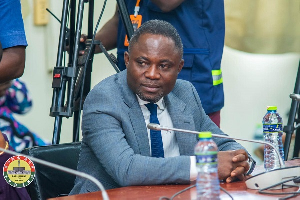As party parliamentary primaries approaches in Ghana, aspirants focus on fostering a constituent-friendly view of themselves through their personal cultivation of the constituency and the use of perks of the office(if incumbent or holding a position in government) to do so. Consider the fact that legislators/aspirants spend on average about 3-4 days a week (which is not highly possible) in their home constituencies.
Consequently, voters focus on what they know about their legislator when they vote and most of that is pleasing to ears and sight. Then, legislative incumbents run-up large reelection margins and use that cushion of votes to pursue their own interests rather than those of voters. Voters are not blind to such activities but they are so easily rationalized by legislators in their frequent visits to their districts and minimized by the truly excellent constituency service they provide voters. And the large vote margins discourage others from contesting the elections of incumbents; hence, incumbents face nominal competition.
However, in this modern day and age, the dynamics in politics have greatly changed towards both voters and aspirants of political parties. In an era where money is an essential electoral resource, the future of voters is at risk. Note that a constituency is important for as long as it sustains the politician’s own interests. Voters/delegates have had to discover a political personal ideology towards aspirants who want to stand on the party’s ticket. This personal ideology of delegates is what I describe as ‘aspirants financial bargaining-power’. This ideology makes delegates cheaper on the face of political aspirants as they (delegates) are bought like goods and services in exchange of votes. Those delegates who get the highest financial returns and have direct access to the ‘cocoa farm’ of the aspirant turn to declare his/her support for the aspirant against party rules. This is the existing phase of Ghana’s political growth.
Aspirants turn to be philanthropists overnight: sharing motorbikes, fertilizers, knapsack sprayers and spraying monies as if they have a key to the warehouse of Bank of Ghana (BOG). They are now chief mourners at public funerals and their donations are always made public with mischievous intent at the end of the tunnel.
Commonly, aspirants are often seen associating with community members, being seen as childrens’ friend, eating common foods with the locals and playing games with the masses wherever they find themselves. Charlie!, but their hired and voluntary photographers are always taking records of every activity for public records as achievements. Oh my God! What is happening to this generational politics of boot licking with its accompanying features.
What is disheartening most times is how delegates and non-delegates weigh the financial muscles of aspirants and then choose who has the biggest ‘cocoa farm’ where cultivation could be made easily. In this case, virtues of truth, honesty and transparency are thrown to the dogs. How then do we expect the winning candidate to work even after winning parliamentary election?!
Without mincing words, our electorates would prefer a Chinese citizen who has wider ‘cocoa farm’ to be elected into Ghana’s parliament to a citizen of Ghana despite the unconstitutionality of the alien citizen. The voices of the electorates would always go after non-sweat harvest that would fill their stomachs temporarily.
The framers of the parties constitution didn’t envisioned this growing calamity that is eating the fabric of our democracy. Amendments need to be made to help restore sanity towards presenting competent candidates even if they have no ‘cocoa farm’ for delegates to harvest.
Freelance Writer
Email: abdulrazaklukman6@gmail.com
Phone: +233.24.244.3937
Opinions of Sunday, 26 January 2020
Columnist: Abdul-Razak Lukman















